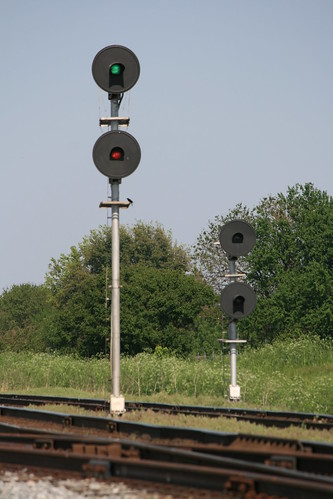Thanks for the feedback.
As for seeing the colors on the traffic lights, they don't look anything alike. I don't read them by by their position. If that were the case, I wouldn't be able to tell the difference when coming to a low-traffic intersection that has only either a single blinking red light (to signal a stop) or a single blinking yellow light (to signal a yield)...but I have no problem telling which is which. The red brake lights on cars are obviously red too.
Really, the only real issue with traffic lights is the green light. The green light is often both very pale and very bright and comes across as off-white. That being said, it would never be confused with either red or yellow.
As for the Ishihara tests, I can pass them with corrective lenses...just like I have to use corrective lenses to see anything. Take my glasses away, and the world turns into a blurred smear. I'm so near-sighted that I certainly couldn't read anything lower than the big "E" on the letter charts the eye doctor has you read. I don't even bother. Maybe I'll get laser surgery one day.
Anyway...if I get selected and pass the test, I guess I'll take the job. If I can't pass the test...I guess I'll look for something else. I would be lying if I said I wouldn't be disappointed though. I prefer to work outside and be moving around, so most of the trade-related jobs (pipefitter, carman, etc) wouldn't really be what I would be looking for. Also, I'm a very health-conscious person and all the research coming out right not in regards to sleep is screaming that working midnight shifts for any significant period of time (more than 3 months) has serious negative health effects in regards to becoming insulin resistant and developing metabolic syndrome (heart disease, hypertension, diabetes). So while I don't care about being on-call...I have serious reservations about working 10+ years on a midnight shift because that just happens to be the way it's always been done.
(One a side note: You just wait and see. I predict that about the time I retire it will be all over the news that companies are going to be getting sued just like they did about the asbestos thing because the research is out now on this and everyone in a position of power who should know DOES know that working for years at night is setting people up for heart attacks, strokes, and diabetes and nobody is doing anything about it because they don't want to face the reality of changing the entire world so that the 3rd shift is eliminated for everyone except for 1st responders and emergency room staff. They've even developed a term for some of the negative effects: Shift Work Disorder...and of course they've even developed a drug for it called NUVIGIL....the side effects of which should steer anyone away from ever taking it)
Anyway...if I don't pass the test, I'll probably look to work as a track laborer...but the pay difference is almost 25%....and that's before overtime is factored in. It also doesn't seem like the type of job that is mentally challenging....and as someone with two degrees, I have a bad feeling about long-term job satisfaction on that career path. Working in signals, though, seems to have all of the things I'm looking for. Work outside, blend of manual work which physically stimulates the body and promotes long-term health and electrical-type work which is mentally challenging, a fair amount of overtime, and great pay. Here's to hoping for the best.
